Key takeaways:
- Difficult conversations can build trust and improve team dynamics, leading to a healthier workplace environment.
- Effective communication techniques, such as active listening and using “I” statements, can transform confrontations into collaborative discussions.
- Preparation and emotional awareness are critical for managing challenging dialogues, enhancing clarity and reducing anxiety.
- Seeking feedback and reflecting on past conversations foster continuous improvement in communication skills.
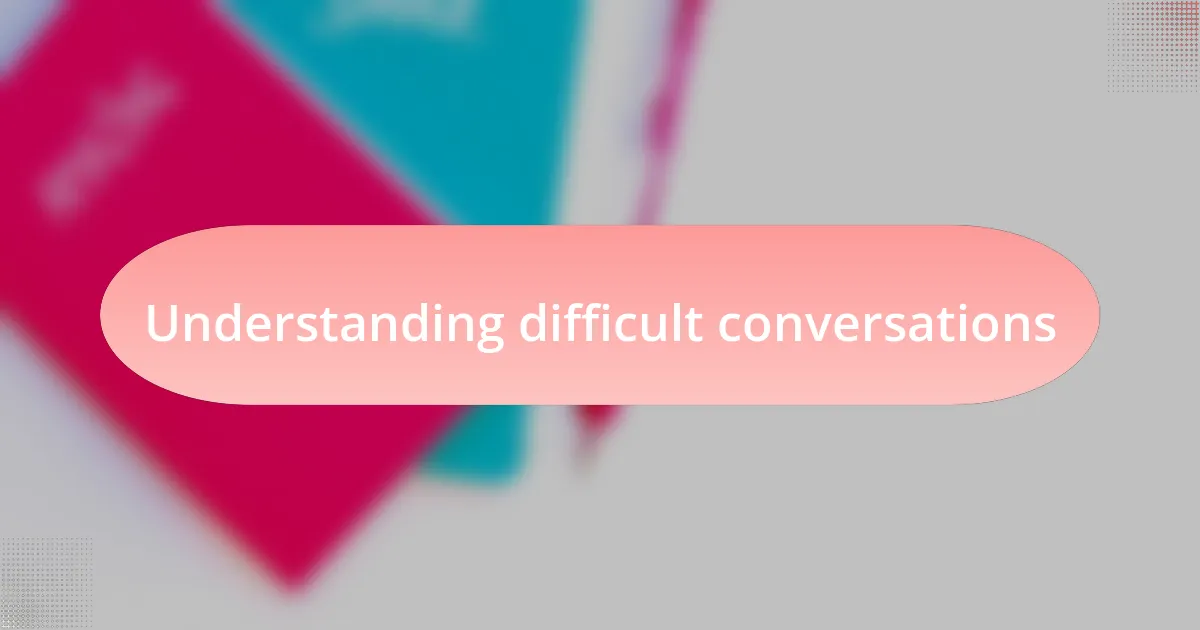
Understanding difficult conversations
Difficult conversations often bring a mix of anxiety and anticipation. I remember once having to address a performance issue with a team member — the weight of that responsibility felt enormous. It made me wonder, how can we approach these talks without letting fear dictate our actions?
When I think of challenging dialogues, I can’t help but recall my early career days, where I would avoid conflicts at all costs, fearing the fallout. With each avoided conversation, I realized that the underlying issues only festered, leading to more significant problems down the line. This experience taught me that addressing concerns head-on can foster trust and clarity, which I find is crucial for any healthy working environment.
It’s also essential to recognize that emotions play a significant role in these interactions. Have you ever noticed how a simple tone can shift a conversation’s dynamic dramatically? I have, and it reaffirmed my belief that understanding the emotional context can turn a tough discussion into a constructive dialogue, paving the way for better relationships and outcomes.
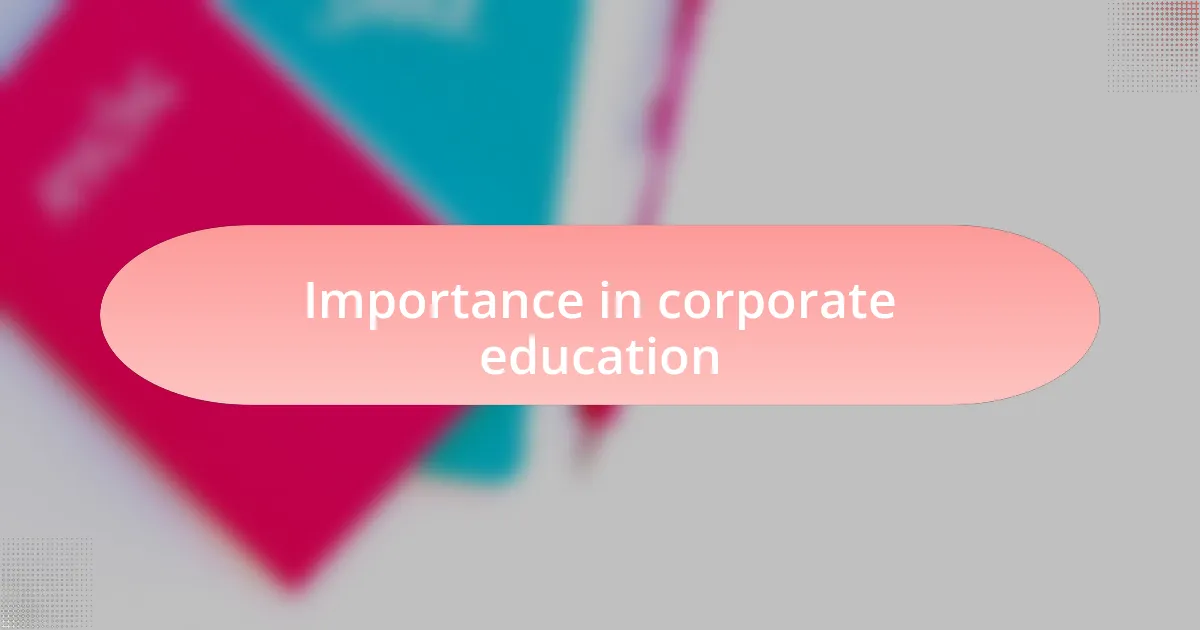
Importance in corporate education
The importance of difficult conversations in corporate education cannot be overstated. I’ve witnessed firsthand how tackling tough topics can not only resolve issues but also enhance team dynamics. For instance, I once participated in a workshop where we practiced giving each other constructive feedback. The vulnerability that emerged during those sessions actually strengthened our connections, fostering a supportive culture where everyone felt heard.
Moreover, these conversations are vital for continuous improvement. Early in my career, I struggled with giving feedback due to fear of rejection. However, once I embraced the potential for growth that these discussions bring, I found them to be transformative, both for myself and my colleagues. When we normalize the act of having challenging dialogues, it becomes easier for individuals to express thoughts and feelings candidly, which ultimately drives innovation and engagement within the team.
Another critical aspect is the influence of these conversations on leadership development. When leaders model effective communication during difficult discussions, it sets a precedent for the entire organization. Reflecting on my experiences, I can confirm that witnessing a leader approach a challenging conversation with grace and empathy motivated me to adopt similar strategies. Don’t you think that fostering such an environment could enhance overall performance and employee satisfaction?
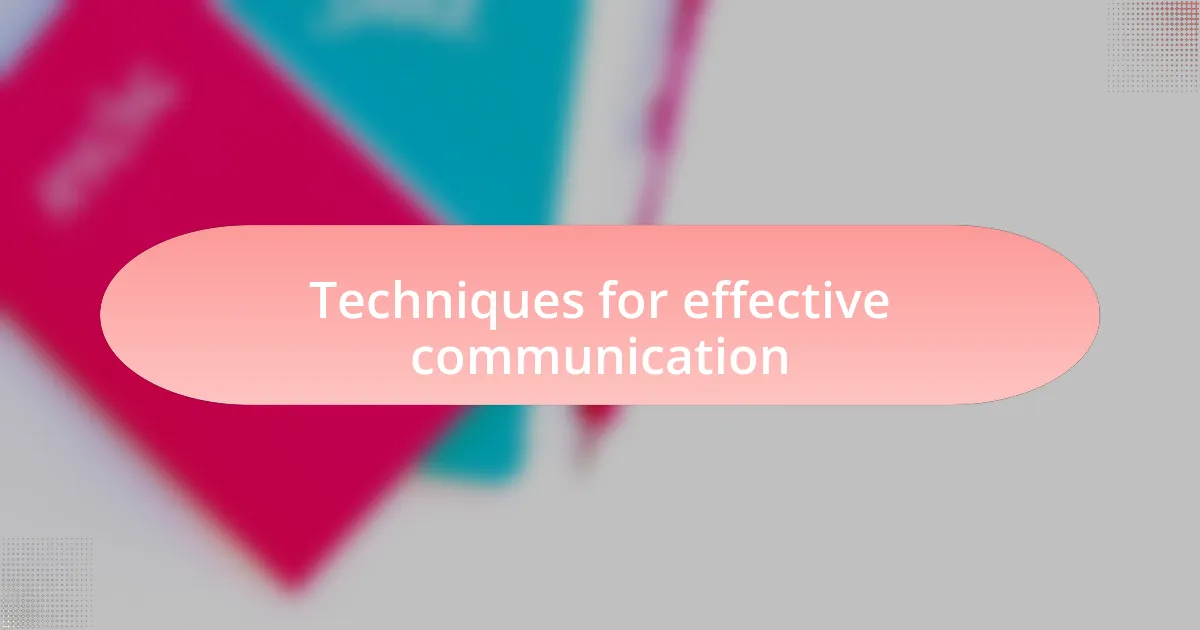
Techniques for effective communication
One technique I’ve found invaluable is active listening. During a recent conversation with a colleague about project delays, I focused entirely on understanding her perspective. I nodded, maintained eye contact, and asked clarifying questions. This approach not only made her feel valued but also allowed me to grasp the nuances of the situation, leading to a collaborative solution instead of a combative one. Have you ever noticed how people open up when they feel genuinely listened to?
Another effective communication technique is to use “I” statements rather than “you” statements. I remember a time when I confronted a teammate about missed deadlines, initially framing my concerns in a way that felt accusatory. By shifting to “I feel overwhelmed when deadlines are missed,” it transformed the tone of the conversation. This simple change encouraged collaboration instead of defensiveness, ultimately driving us toward a shared goal. Have you considered how your choice of words affects the outcome of difficult conversations?
Preparation plays a crucial role, too. I often find myself jotting down key points before entering a challenging dialogue. The first time I did this before a performance review, it not only eased my nerves but also kept the discussion focused and respectful. It’s amazing how a bit of preparation can prevent misunderstandings and ensure that crucial issues are addressed. Do you take time to prepare for significant conversations, or do you prefer a more spontaneous approach?
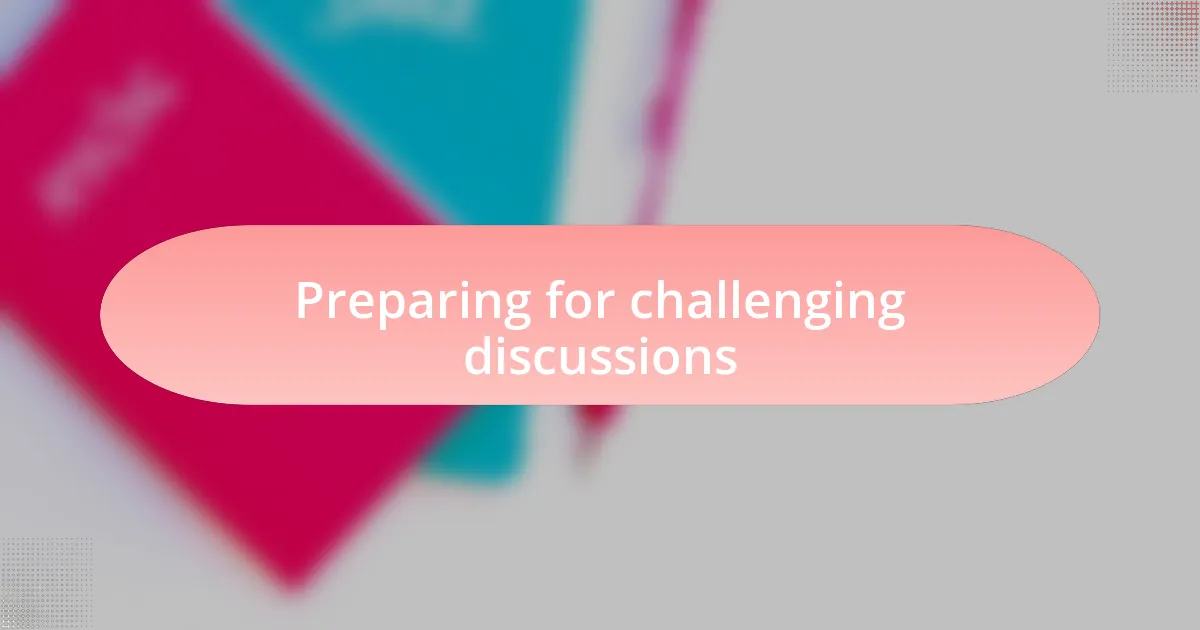
Preparing for challenging discussions
Before diving into any challenging discussion, I like to take a moment to reflect on my emotions and motivations. I remember preparing for a difficult conversation about a colleague’s performance. I wrote down not just the points I needed to address, but also how I felt about the situation. This practice helped me understand my feelings and tailor my message in a way that was honest yet compassionate. Have you ever considered how your state of mind influences the tone of your discussions?
Another key aspect of preparation is anticipating potential reactions. When I was preparing for a conversation regarding a departmental policy change, I thought ahead about how my colleague might respond. I even rehearsed my answers to their likely concerns. This anticipation not only boosted my confidence but also allowed me to steer the conversation productively. Have you tried to predict how the other person might react in your past discussions?
Finally, I like to set the right environment for these discussions. I recall a time when I chose a quiet, neutral space for a conversation about a project conflict. The calm surroundings encouraged openness and reduced tension significantly. This little adjustment made a big difference in how the conversation unfolded. Have you noticed how the environment can impact the dynamics of your discussions?
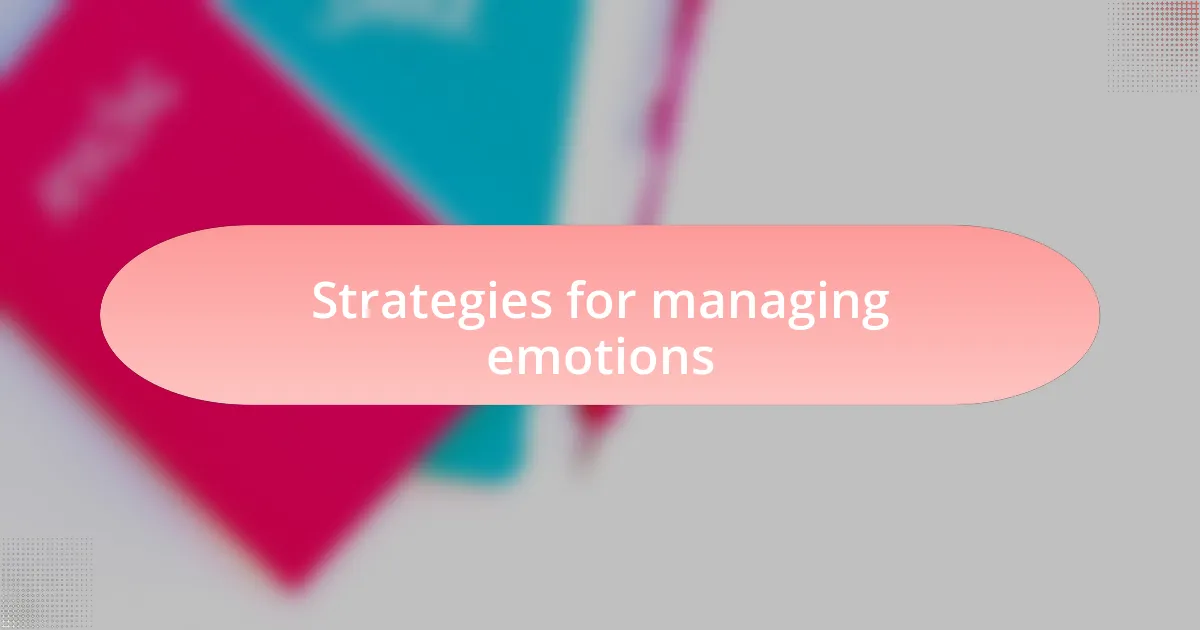
Strategies for managing emotions
Managing emotions during difficult conversations is crucial for achieving a constructive outcome. In one of my experiences, I had to address a sensitive issue with a friend at work. Instead of letting my anxiety take control, I practiced deep breathing for a few minutes beforehand. This simple technique calmed my nerves and helped me focus on the discussion rather than my racing thoughts. Have you ever tried breathing exercises to ground yourself before an important talk?
Another strategy I often implement is acknowledging my emotions openly. During a challenging meeting about performance feedback, I admitted that I felt apprehensive about the conversation’s outcome. This honesty not only created a safe space but also encouraged my colleague to share their feelings. I find that when I voice my emotions, it invites vulnerability, fostering a more genuine dialogue. Have you experienced a shift in tone when you acknowledged your feelings?
Lastly, I’ve learned the power of reframing negative emotions as opportunities for growth. Once, while discussing a miscommunication with a team member, I felt frustration bubbling up. Instead of letting it derail our discussion, I reframed my frustration as a desire to improve our collaboration. This perspective shift shifted my approach, allowing us to brainstorm solutions together instead of getting caught in blame. Isn’t it interesting how reframing emotions can lead to more productive conversations?

Personal experiences with difficult conversations
A few years ago, I found myself in a tough spot when I had to confront a colleague about their consistently late project submissions. As we sat down, I could feel the weight of the conversation pressing on my chest. To ease the tension, I shared a personal example of a time I struggled with deadlines myself. This not only made the conversation more relatable, but it also reminded us that we all have our challenges. Have you ever found that sharing a piece of your own story helps to lighten the mood?
On another occasion, I had to talk with a mentor about my desire for more responsibility in my role. Approaching this conversation was daunting; I worried about how it might be perceived. During our chat, I focused on my passion for growth. It felt empowering to express my aspirations, and in doing so, I could sense that my mentor appreciated my honesty. Have you ever noticed how expressing your ambitions can change the energy of a conversation?
In a recent team meeting, I faced a particularly tough conversation regarding a project that wasn’t meeting expectations. Instead of placing blame, I shared my feelings of disappointment and the impact it had on the team morale. This candidness prompted my teammates to open up, too. We ended up collaborating on a fresh approach, transforming a potentially negative exchange into a constructive strategy session. Isn’t it fascinating how vulnerability can pave the way for collective problem-solving?
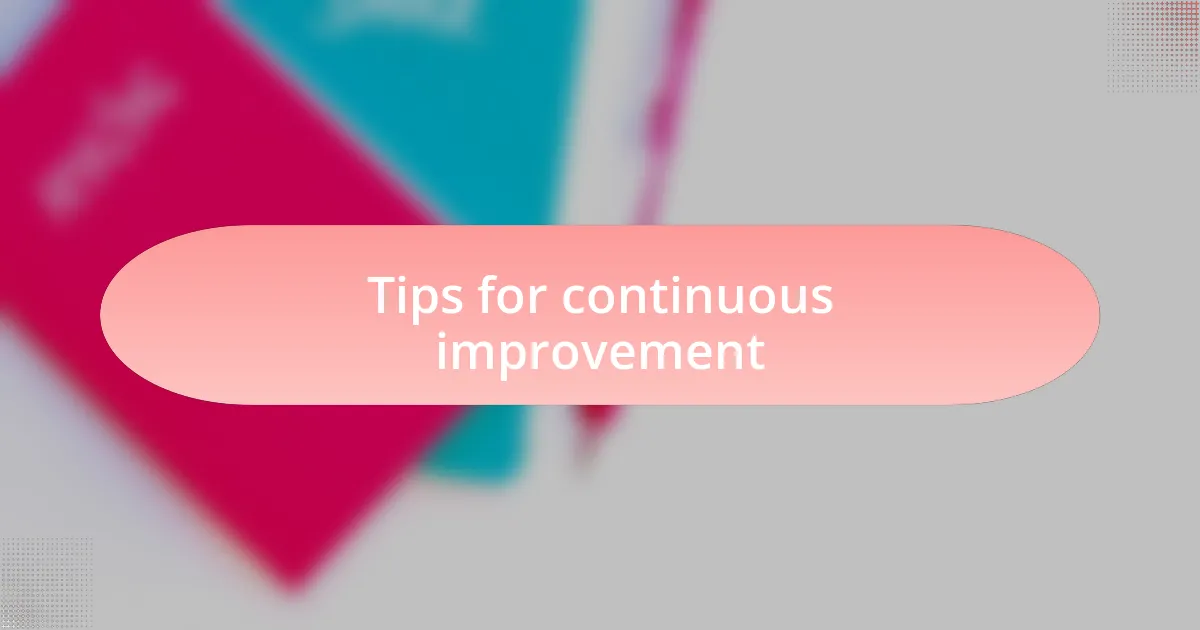
Tips for continuous improvement
One powerful tip for continuous improvement in difficult conversations is to actively seek feedback after the discussion. I recall a time when I engaged in a challenging dialogue with a teammate about their communication style. Once the conversation concluded, I asked for their thoughts on how it went. This not only showed I valued their perspective but also opened the door for future conversations, creating a culture of openness. Have you ever considered how feedback can refine your conversational skills over time?
Another effective strategy is to practice role-playing scenarios before engaging in a tough conversation. I remember preparing for a discussion about budget cuts with my team by simulating potential reactions and responses. This practice helped me anticipate challenges and formulate my approach more clearly. It was astonishing to see how this preparation made me feel more in control and less anxious. Have you tried this technique to build your confidence?
Lastly, I find that reflecting on past conversations can be incredibly enlightening. After a particularly challenging talk with a client, I took some time to think about what went well and what could be improved. By journaling my thoughts, I identified specific phrases that resonated positively and areas where I could have expressed myself better. This reflection allowed me to continually evolve my approach, leading to more effective exchanges in the future. Don’t you think that learning from each experience can transform how we communicate in the long run?